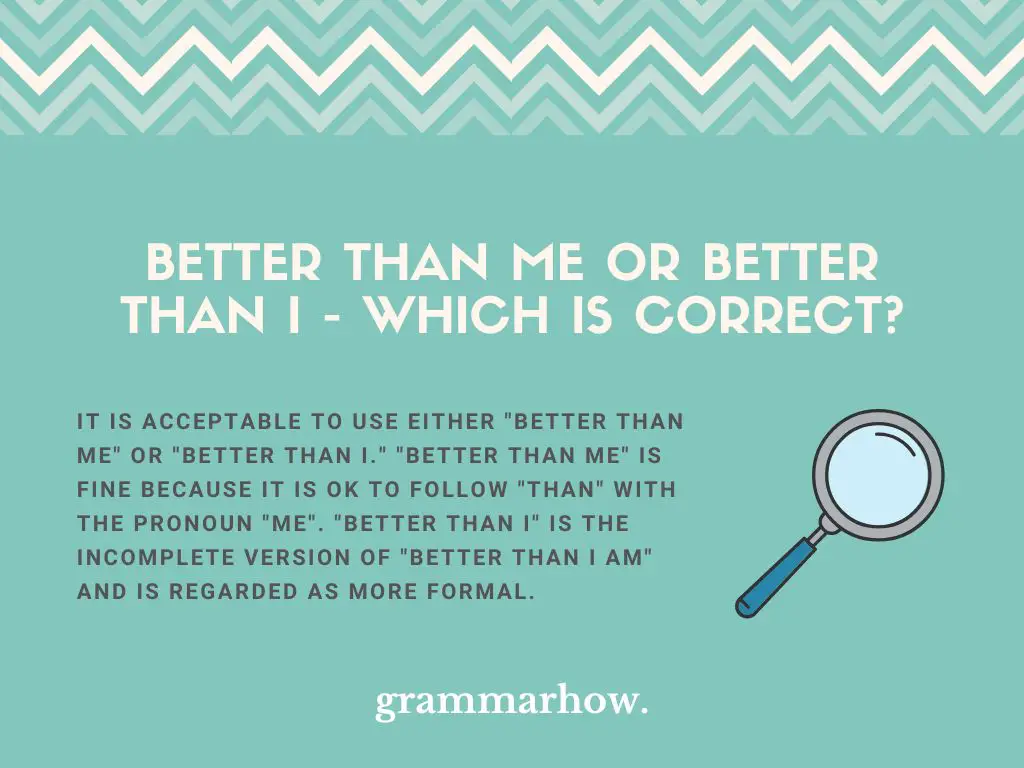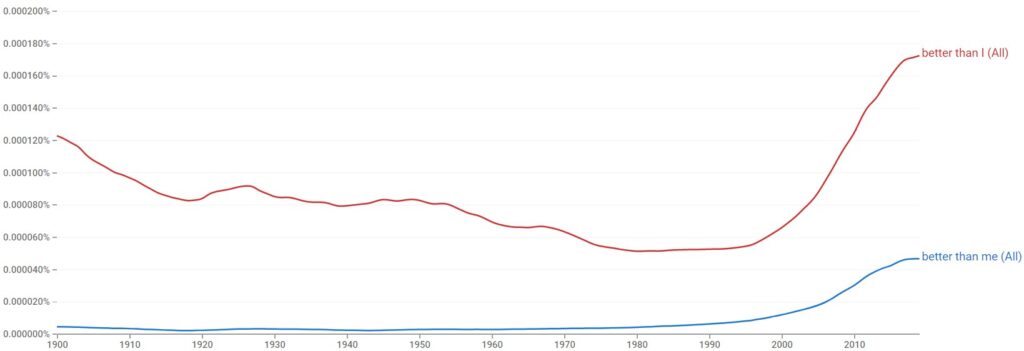You will often hear the terms “better than me” or “better than I” in English, and they cause a great deal of controversy among English grammar purists. This article shows why both are valid and explains how to use the phrases correctly and accurately
Better Than Me or Better Than I – Which Is Correct?
It is acceptable to use either “better than me” or “better than I.” “Better than me” is fine because it is ok to follow “than” with the pronoun “me”. “Better than I” is the incomplete version of “better than I am” and is regarded as more formal.

With “better than I”, it takes a subject pronoun (I, he, she) after the conjunction “than.” In the complete sentence, a verb such as “am” or “is” is inserted to make the sentence complete.
Alternatively, with the phrase “better than me”, we can follow the preposition “than” with an object pronoun (me, him, her). The terms “better than me” or “better than her/him” are more commonly heard rather than read but are nonetheless widespread.
In writing, especially formal writing, it is usually preferred to use the full version, which would be “better than I am.”
Furthermore, people often choose to use pronouns like “me” because it can make the sentence confusing if you use the “I” but do not include the verb.
Better Than Me
Even though some English grammar puritans may say that it is incorrect, it is acceptable to say “better than me,” and it is considered correct.
It is a little less formal than “better than I am” or “better than he is”, but it is such a standard part of everyday speech that it is not seen as “wrong” by most people.
These sentences show how the phrase is used:
- My wife has always been better than me at languages.
- My brothers have always been better than me at sports, but I am more intelligent.
- I’m not too fond of it when people think they are better than me.
- Don’t talk to me as though you think you are better than me.
- He should be in the starting line-up because he is better than me.
Better Than I
The term “better than I” is seen by most people as the formal and correct option, rather than “better than me”. Therefore, it is probable you will find it in literature and formal texts, although more often than not, it contains a verb.
When writing, if you choose to use “I”, it is better that you insert the verb to make the sentence clearer and more complete.
Here are sentences that include the term:
- He performed better than I (did), so he deserved to win.
- She is better than I (am) at writing, so she has been giving me lessons.
- He is better than she (is) at dealing with customers.
- He said he was better than I (am) at spelling, but I beat him in the contest.
- You know him better than I (do) so you should ask him what’s wrong
Which Phrase Is Used the Most?
The Google Ngram Viewer tells us that the phrase with the “I” is more prevalent in writing compared to “better than me” and has always been the more common choice.

During the 1980s and 90s, there was no significant disparity between the terms. However, since then, “better than I” has grown in popularity and is now used more often than “better than me.”
It should also be noted, though, that in common everyday speech, it is probably more likely to hear “better than me/her/him” because it is easier and faster to say than “better than I am” or “better than he is.”
Final Thoughts
The terms “better than I” and “better than me” cause much debate about which is correct. They are, in fact, both perfectly fine to use. Whilst “better than I” is viewed as the more formal option, “better than me” is commonly used and accepted in everyday English.

Martin holds a Master’s degree in Finance and International Business. He has six years of experience in professional communication with clients, executives, and colleagues. Furthermore, he has teaching experience from Aarhus University. Martin has been featured as an expert in communication and teaching on Forbes and Shopify. Read more about Martin here.
